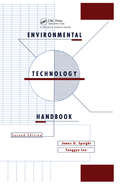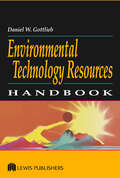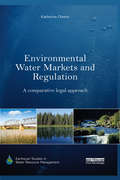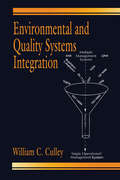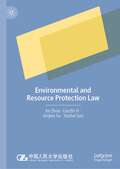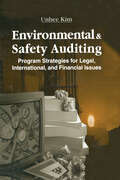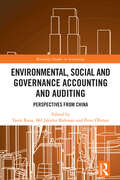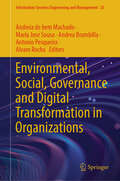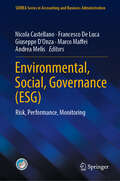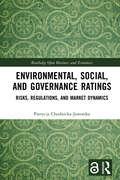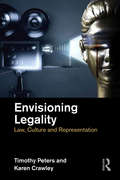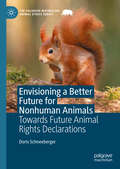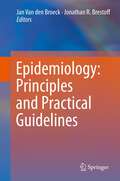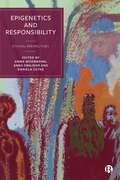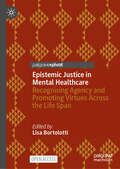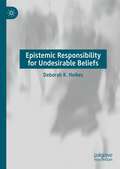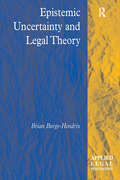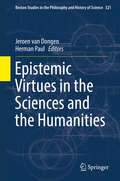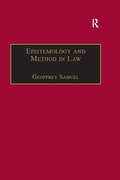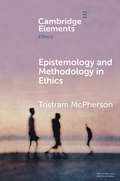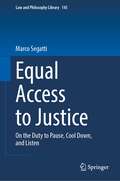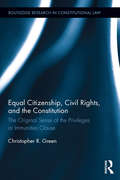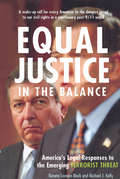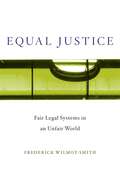- Table View
- List View
Environmental Technology Handbook: 2nd Edition (Applied Energy Technology Ser.)
by James G SpeightHistorically, the development of civilization has upset much of the earth’s ecosystem leading to air, land, and water pollution. The author defines pollution as the introduction of a foreign substance into an ecosystem via air, land or water. This book delves into issues that effect the everyday lives of people who come in contact with these hazards. By examining these issues, this body of work aims to stimulate debate and offer solutions to the ever-growing threat to the environment and humanity. Includes problems with each chapter, Explores issues such as control of gaseous emissions, waste recycling and waste disposal, Explains physical and thermal methods of waste management, Provides definitions and resources for future reference, Discusses the history of environmental technology.
Environmental Technology Resources Handbook
by Daniel W. GottliebThis handbook guides the user to hundreds of technologies, practices, partnership opportunities, and funding resources. Presented in non-technical language, it covers hundreds of publicly available resources for pollution prevention, control, remediation, and assessment. Environmental Technology Resources Handbook will help you:
Environmental Water Markets and Regulation: A comparative legal approach (Earthscan Studies in Water Resource Management)
by Katherine OwensRiver systems around the world are degraded and are being used unsustainably. Meeting this challenge requires the development of flexible regimes that have the potential to meet essential consumptive needs while restoring environmental flows. This book focuses on how water trading frameworks can be repurposed for environmental water recovery and aims to conceptualise the most appropriate role for law in supporting recovery through these frameworks. The author presents a comprehensive study of the legal frameworks in four jurisdictions: the States of Oregon and Colorado in the western United States; the province of Alberta in Canada; and the Murray-Darling Basin in Australia/Basin State of New South Wales. A close comparative analysis of these four jurisdictions reveals a variety of distinctive regulatory arrangements and collaborations between public and private actors. In all cases, the law has been deployed to steer and coordinate these water governance activities. The book argues that each regime is based on a particular regulatory strategy, with different conceptions of the appropriate roles for, and relationships between, various actors and institutions. Legal frameworks do not have the capacity to rationalise and provide an overarching and absolute solution to the complex environmental and governance issues that arise in the context of environmental water transactions. Rather, the role of law in this context needs to be reconceptualised within the paradigm of regulatory capitalism as establishing and maintaining the limits within which regulatory participants can operate, innovate and collaborate.
Environmental and Quality Systems Integration
by William C. CulleyGlobal competition, corporate downsizing and corporate restructuring have forced many firms to reevaluate their operating methods. Today, corporations must do more with less while still watching the bottom line and improving profitability. ISO 14000 and ISO 9000, because of their similar management system requirements and auditing procedures, are g
Environmental and Resource Protection Law
by Ke Zhou Luozhi Yi Xinjian Su Youhai SunThis book mainly focuses on environmental and resource law under Chinese law, involving secondary disciplines such as international law, civil law, administrative law and criminal law, as well as issues related to other first-class disciplines such as environmental science and ecology. The contents include general theory of environmental law (basic theory), prevention and control of environmental pollution, natural resources protection law and international environmental law. It basically covers all fields of China's environmental law and is a handy reference for those seeking to understand it.
Environmental and Safety Auditing: Program Strategies for Legal, International, and Financial Issues
by Unhee KimThis is a complete and concise guide to creating and managing a successful environmental audit program. It provides step-by-step guidance on setting up an audit program for nearly every major component of environmental concern, from air standards to workplace safety, and from effluent discharge to waste handling and disposal.
Environmental, Social and Governance Accounting and Auditing: Perspectives from China (Routledge Studies in Accounting)
by Tarek Rana Peter Öhman Md Jahidur RahmanIn a rapidly evolving world where Environmental, Social, and Governance (ESG) considerations are at the forefront of business and investment decisions, understanding the intricate interplay between ESG factors and corporate performance is paramount. This book demystifies ESG by providing empirical insights from the unique perspective of China, shedding light on the impact of ESG on financial performance and corporate governance. It investigates the impact of environmental expertise, social variability, and board governance model on firm performance.The book sets the stage by introducing the reader to the significance of ESG in today's corporate world, examining empirical evidence gathered from a decade of data analysis on Chinese-listed companies. It explores how ESG practices influence corporate financial performance and what role audit quality plays in this equation. Drawing from a wealth of data, it provides practical insights into the effects of ESG disclosure, ownership structures, corporate governance, and more on the performance of businesses. It offers a clear understanding of the empirical realities in China while addressing a global audience interested in harnessing ESG for sustainable corporate success. It provides valuable lessons and comparisons that can benefit readers beyond China's borders.The book bridges the gap between research and practice, translating complex research findings into actionable recommendations, enhancing its appeal to both academic and professional audiences. It is a must-read for scholars, students and researchers seeking actionable insights into the world of ESG. Further, it discusses ESG practice and policy implications, offering recommendations for stakeholders including policymakers, investors, managers, and auditors.
Environmental, Social, Governance and Digital Transformation in Organizations (Information Systems Engineering and Management #35)
by Alvaro Rocha Maria Jose Sousa Andreia de bem Machado Andrea Brambilla Antonio PesqueiraThis book investigates the dynamic interaction between environmental, social and governance (ESG) programs and digital transformation, addressing important themes such as corporate governance, ethical leadership, stakeholder engagement and sustainability in a digital age. Exploring a range of sectors, it examines the impact of AI on governance, child protection and smart cities, along with the integration of ESG strategies in healthcare, waste management and Industry 4.0. Through case studies and analysis, he highlights challenges such as technological stress, while offering insights into sustainable business ecosystems, strategic leadership and transparency. The 22-chapter book bridges the gap between academia and the sector, presenting innovative frameworks and practical solutions to promote resilient, ethical and sustainable digital transformation.
Environmental, Social, Governance: Risk, Performance, Monitoring (SIDREA Series in Accounting and Business Administration)
by Andrea Melis Marco Maffei Francesco De Luca Nicola Castellano Giuseppe D’OnzaThis edited volume covers Environmental, Social, and Governance (ESG) topics and their impact on companies' financial performance. It is the outcome of an academic research group coordinated by the Italian Society of Professors of Business Administration and Accounting. The book discusses corporate governance, management accounting and control systems, performance measurement, auditing and risk management, and their roles in business strategy and corporate finance. It includes several case studies from Italian corporation to illustrate the theories and their implementation in practice.
Environmental, Social, and Governance Ratings: Risks, Regulations, and Market Dynamics (Routledge Open Business and Economics)
by Patrycja Chodnicka-JaworskaIn recent years, the world of finance and investments has changed, considering measures related to environmental, social, and governance (ESG) factors for socially responsible investments. ESG scoring and ratings are used to estimate ESG risk.This book presents ESG ratings and scorings and their providers and lists problems with data quality, data sources, and unknown methodology, contributing to the green- and social-washing ESG rating phenomenon. The value of assets invested in green instruments relies on high-quality ESG ratings to measure green transition. Data greenwashing negatively impacts the financial market, especially the stock price, fund activities, and bond markets. The size of the rated company, geographical location, and industry biases are considered in understanding the greenwashing phenomenon. This book illustrates all the problems related to ESG rating inflation, conflicts of interest, models of payment, and internal and external ratings. It describes current regulations, initiatives, and practical knowledge of ESG scoring.Academics and students of financial law, economics, and financial sustainability will find this book invaluable. The practical implications in the book will benefit sustainability-concerned regulators and practitioners who estimate ESG risk (especially in financial institutions).The Open Access version of this book, available at www.taylorfrancis.com, has been made available under a Creative Commons Attribution-Non Commercial-No Derivatives (CC-BY-NC-ND) 4.0 International license.
Envisioning Legality: Law, Culture and Representation
by Karen Crawley Timothy PetersEnvisioning Legality: Law, Culture and Representation is a path-breaking collection of some of the world’s leading cultural legal scholars addressing issues of law, representation and the image. Law is constituted in and through the representations that hold us in their thrall, and this book focuses on the ways in which cultural legal representations not only reflect or contribute to an understanding of law, but constitute the very fabric of legality itself. As such, each of these ‘readings’ of cultural texts takes seriously the cultural as a mode of envisioning, constituting and critiquing the law. And the theoretically sophisticated approaches utilised here encompass more than simply an engagement with ‘harmless entertainment’. Rather they enact and undertake specific political and critical engagements with timely issues, such as: the redressing of past wrongs; recognising and combatting structural injustices; and orienting our political communities in relation to uncertain futures. Envisioning Legality thereby presents a cultural legal studies that provides the means for engaging in robust, sustained and in-depth encounters with the nature and role of law in a global, mediated world.
Envisioning a Better Future for Nonhuman Animals: Towards Future Animal Rights Declarations (The Palgrave Macmillan Animal Ethics Series)
by Doris SchneebergerThis book presents an ethical discussion of the possible future Universal Declarations of (diverse specific nonhuman) Animal Rights. It contributes to a basis for a discussion about (nonhuman) animal rights concerning diverse aspects and quality of (nonhuman) animal life. Doris Schneeberger deals with the interpretation and justification of animal rights, and argues that because (nonhuman) animals are individuals whose lives are intrinsically and inherently valuable, their goods and welfare ought to be protected. She claims that these rights should be protected in possible morally advanced societies of the future.
Epidemiology: Principles and Practical Guidelines
by Jonathan R Brestoff Jan Van den BroeckThis textbook presents epidemiology in a practical manner, contextualized with discussions of theory and ethics, so that students and professionals from all academic backgrounds may develop a deep appreciation for how to conduct and interpret epidemiological research. Readers will develop skills to: -Search for and appraise literature critically, -Develop important research questions, -Design and implement studies to address those questions, -Perform and interpret fundamental statistical estimations and tests, -Consider the ethical implications of all stages of research, -Report findings in publications, and -Advocate for change in the public health setting. Epidemiology is and will remain a discipline in motion, and this textbook aims at reflecting this dynamism and keeping pace with its momentum. This textbook is not only a classroom tool with high utility but also an essential reference and guide for those engaging in research involving human subjects.
Epigenetics and Responsibility: Ethical Perspectives
by Emma Moormann, Anna Smajdor and Daniela CutasEPUB and EPDF available Open Access under CC-BY-NC-ND licence. We tend to hold people responsible for their choices, but not for what they can’t control: their nature, genes or biological makeup. This thought-provoking collection redefines the boundaries of moral responsibility. It shows how epigenetics reveals connections between our genetic make-up and our environment. The essays challenge established notions of human nature and the nature/nurture divide and suggest a shift in focus from individual to collective responsibility. Uncovering the links between our genetic makeup, environment and experiences, this is an important contribution to ongoing debates on ethics, genetics and responsibility.
Epistemic Injustice: Power and the Ethics of Knowing
by Miranda FrickerEpistemic Injustice explores a form of injustice which has so far been largely ignored in English-language philosophy: epistemic injustice - that is to say, a wrong suffered in one's capacity as a knower. Miranda Fricker distinguishes two forms of epistemic injustice: testimonial injustice and hermeneutical injustice. In connection with both, she argues that our testimonial sensibility needs to incorporate a corrective, anti-prejudicial virtue that canbe used to promote a more veridical and a more democratic epistemic practice.
Epistemic Justice in Mental Healthcare: Recognising Agency and Promoting Virtues Across the Life Span
by Lisa BortolottiThis open access book explores epistemic justice in mental healthcare, bringing together perspectives from psychologists, psychiatrists, philosophers, activists, and lived experience researchers. Through eight chapters, authors identify threats to the agency of people who hear voices, experience depression, have psychotic symptoms, live with dementia, are diagnosed with personality disorders, and face serious mental health issues while receiving palliative care. Considering the power asymmetries in clinical interactions, where patients are vulnerable and healthcare professionals are uniquely placed to offer support, this book reaffirms the importance of recognizing patients as agents and collaborators. Topics covered include trust in the therapeutic relationship, dignity at the end of life, the social dimension of health, stigma in an acute ward, the harm caused by biases and stereotypes, the role of clinical communication, and the promise of digital health. Students, academic researchers, practitioners, as well as mental health charities will benefit from this timely collection.
Epistemic Responsibility for Undesirable Beliefs
by Deborah K. HeikesThis book considers whether we can be epistemically responsible for undesirable beliefs, such as racist and sexist ones. The problem with holding people responsible for their undesirable beliefs is: first, what constitutes an “undesirable belief” will differ among various epistemic communities; second, it is not clear what responsibility we have for beliefs simpliciter; and third, inherent in discussions of socially constructed ignorance (like white ignorance) is the idea that society is structured in such a way that white people are made deliberately unaware of their ignorance, which suggests their racial beliefs are not epistemically blameworthy. This book explores each of these topics with the aim of establishing the nature of undesirable beliefs and our responsibility for these beliefs with the understanding that there may well be (rare) occasions when undesirable beliefs are not epistemically culpable.
Epistemic Uncertainty and Legal Theory (Applied Legal Philosophy)
by Brian Burge-HendrixCrossing the usual boundaries of abstract legal theory, this book considers actual charter systems - legal systems with explicitly posited moral-political rights, such as those of Canada and the United States - as well as cases in constitutional adjudication. It shows the worth of careful reflection on methodological and meta-theoretical issues for a comprehensive account of a present-day legal system which is fast becoming the norm. The author explicitly connects the ongoing Methodology Debate within legal philosophy to constitutional adjudication and Canadian law. By drawing out the implications of the Methodology Debate and the challenge of giving a proper account of constitutional adjudication in a general theory of law, the study examines how a descriptive, morally and politically neutral legal theory can deal with epistemic uncertainty - uncertainty about the actual status of moral-political legal provisions and their jurisprudential function - in a thoroughgoing manner. It also demonstrates the merits of a minimalist version of Legal Positivism with regard to the practical importance of charters in charter systems and societies.
Epistemic Virtues in the Sciences and the Humanities
by Jeroen Van Dongen Herman PaulThis book explores how physicists, astronomers, chemists, and historians in the late nineteenth and early twentieth centuries employed 'epistemic virtues' such as accuracy, objectivity, and intellectual courage. In doing so, it takes the first step in providing an integrated history of the sciences and humanities. It assists in addressing such questions as: What kind of perspective would enable us to compare organic chemists in their labs with paleographers in the Vatican Archives, or anthropologists on a field trip with mathematicians poring over their formulas? While the concept of epistemic virtues has previously been discussed, primarily in the contexts of the history and philosophy of science, this volume is the first to enlist the concept in bridging the gap between the histories of the sciences and the humanities. Chapters research whether epistemic virtues can serve as a tool to transcend the institutional disciplinary boundaries and thus help to attain a 'post-disciplinary' historiography of modern knowledge. Readers will gain a contextualization of epistemic virtues in time and space as the book shows that scholars themselves often spoke in terms of virtue and vice about their tasks and accomplishments. This collection of essays opens up new perspectives on questions, discourses, and practices shared across the disciplines, even at a time when the neo-Kantian distinction between sciences and humanities enjoyed its greatest authority. Scholars including historians of science and of the humanities, intellectual historians, virtue epistemologists, and philosophers of science will all find this book of particular interest and value.
Epistemology and Method in Law (Applied Legal Philosophy #17)
by Geoffrey SamuelThis book seeks to question the widely held assumption in Europe that to have knowledge of law is simply to have knowledge of rules. There is a knowledge dimension beyond the symbolic which reaches right into the way facts are perceived, constructed and deconstructed. In support of this thesis the book examines, generally, the question of what it is to have knowledge of law; and this examination embraces not just the conceptual foundations, methods, taxonomy and theories used by jurists. It also examines the epistemological schemes used by social scientists in general in order to show that such schemes are closely related to the schemes of intelligibility used by lawyers and judges.
Epistemology and Methodology in Ethics (Elements in Ethics)
by Tristram McPhersonThis Element introduces several prominent themes in contemporary work on the epistemology and methodology of ethics. Topics addressed include skeptical challenges in ethics, epistemic arguments in metaethics, what (if anything) is epistemically distinctive of the ethical. Also considered are methodological questions in ethics, including questions about which ethical concepts we should investigate, and what our goals should be in ethical inquiry.
Equal Access to Justice: On the Duty to Pause, Cool Down, and Listen (Law and Philosophy Library #145)
by Marco SegattiIt is wrong when someone cannot exercise their rights in a court of law because they have no money to pay for a good lawyer, because they are too scared of the possible consequences, or because they simply don’t know that the law protects them. But does that mean governments have an obligation to intervene? And if so, how?This book provides the first systematic philosophical theory of equal access to justice. It begins by identifying the content of claims to equal access to justice. Then, it reviews traditional political and legal arguments on the right of access to justice, which it argues are both illuminating and insufficient. The best comparative way to approach equal access to justice, the book argues, is to think through the requirements of a moral, pre-political, duty to – at times and provisionally – pause, cool down and listen: in other words, we ought to demand that governments step in and protect access rights, because we have a moral and pre-political interest in cultivating our ability to comply with this duty. It is the recognition of this duty which best explains both law’s potential for promoting, as well as its potential for endangering, equal justice. In closing, the book tests this novel theory of equal access to justice against contemporary trends and reforms in procedural law.
Equal Citizenship, Civil Rights, and the Constitution: The Original Sense of the Privileges or Immunities Clause (Routledge Research in Constitutional Law)
by Christopher GreenThe Privileges or Immunities Clause of the Fourteenth Amendment is arguably the most historically important clause of the most significant part of the US Constitution. Designed to be a central guarantor of civil rights and civil liberties following Reconstruction, this clause could have been at the center of most of the country's constitutional controversies, not only during Reconstruction, but in the modern period as well; yet for a variety of historical reasons, including precedent-setting narrow interpretations, the Privileges or Immunities Clause has been cast aside by the Supreme Court. This book investigates the Clause in a textualist-originalist manner, an approach increasingly popular among both academics and judges, to examine the meanings actually expressed by the text in its original context. Arguing for a revival of the Privileges or Immunities Clause, author Christopher Green lays the groundwork for assessing the originalist credentials of such areas of law as school segregation, state action, sex discrimination, incorporation of the Bill of Rights against states, the relationship between tradition and policy analysis in assessing fundamental rights, and the Fourteenth Amendment rights of corporations and aliens. Thoroughly argued and historically well-researched, this book demonstrates that the Privileges or Immunities Clause protects liberty and equality, and it will be of interest to legal academics, American legal historians, and anyone interested in American constitutional history.
Equal Justice in the Balance: America's Legal Responses to the Emerging Terrorist Threat
by Michael J. Kelly Raneta Lawson MackWith its sweeping critique of the USA Patriot Act and the Bush administration's maneuvers in pursuit of terrorists, Equal Justice in the Balance is a sobering and exacting look at American legal responses to terrorism, both before and after 9/11. The authors detail wide-ranging and persuasive evidence that American antiterrorism legislation has led to serious infringements of our civil rights. They show us how deviations from our fundamental principles of fairness and justice in times of heightened national anxiety-whether the Red Scare, World War II, or the War on Terrorism-have resulted in overreaction and excess, later requiring apologies and reparations to those victimized by a paranoia-driven justice system. While terrorist attacks-especially on a large scale and on American soil-damage our national pride and sense of security, the authors offer powerful arguments for why we must allow our judicial infrastructure, imperfect as it is, to respond without undue interference from the politics of anger and vengeance.
Equal Justice: Fair Legal Systems in an Unfair World
by Frederick Wilmot-SmithIt cannot be fair that wealthy people enjoy better legal outcomes. That is why Frederick Wilmot-Smith argues that justice requires equal access to legal resources. At his most radical, he urges us to rethink the centrality of the market to legal systems, so that those without means can secure justice and the rich cannot escape the law’s demands.
